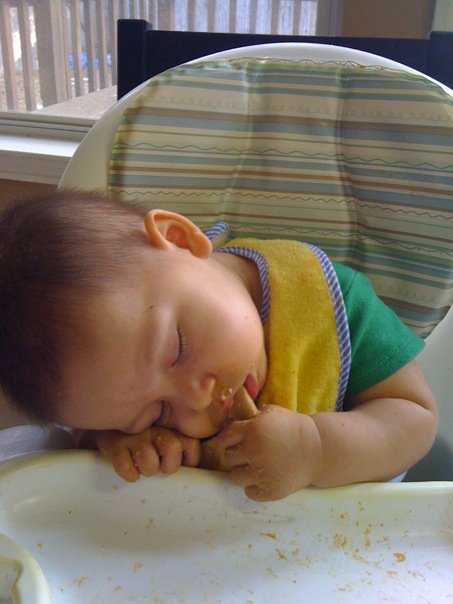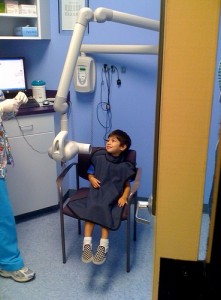
Cry It Out or Co-Sleeping, Is One Way Really the Best?
 I have mentioned before in various blog posts that my 7 month old baby boy is still waking up 3 or 4 times a night. At the 6 month baby check up my Pediatrician recommended that we try to eliminate the 2:00 or 3:00 a.m. feeding. I don’t remember her telling me how to do that. I do remember that she told me that if he can put himself to sleep at 7:00 p.m. with no crying, then he should be able to put himself back to sleep at 3:00 a.m. with no crying. It makes sense to me. That week I tried letting my baby cry it out (CIO). I finally gave up after an hour and went to nurse him. When I nursed him, he was pissed. He kicked and pinched me. Then he continued to cry even after nursing. After that night I was reluctant to try CIO again.
I have mentioned before in various blog posts that my 7 month old baby boy is still waking up 3 or 4 times a night. At the 6 month baby check up my Pediatrician recommended that we try to eliminate the 2:00 or 3:00 a.m. feeding. I don’t remember her telling me how to do that. I do remember that she told me that if he can put himself to sleep at 7:00 p.m. with no crying, then he should be able to put himself back to sleep at 3:00 a.m. with no crying. It makes sense to me. That week I tried letting my baby cry it out (CIO). I finally gave up after an hour and went to nurse him. When I nursed him, he was pissed. He kicked and pinched me. Then he continued to cry even after nursing. After that night I was reluctant to try CIO again.
In the next few weeks I did everything else I could think to try. I started with his naps and created a more structured nap time. He responded very well to the schedule and was sleeping better in the day time, but no change in the night time. I tried feeding him more solid food. I even stuffed him with solids until he wouldn’t eat another bite at dinner time. Still no change. He wakes up around 10:30 or 11:00 p.m. and I had my husband try to give him formula. He wouldn’t drink from the bottle. We tried that because my husband gave him formula one morning during one of my long runs and he slept longer than usual after drinking the formula.
This past week we went back to the CIO method. After he cried for a while I was reluctant to go in and breastfeed for fear that I would get beat up again. I thought it was best to let him finish crying on his own. He was mad, but I really felt like he was alright. (He had just nursed 2 hours before he woke up again.) It seems to be working, because each night it seems to be getting better. Last night he only woke up once.
I am not sure what the alternative is to the CIO method. Is it just pushing through with the many night time feedings with hopes that it won’t last much longer? Attachment Parenting International recommends Co-Sleeping. My son did sleep in my room in a bassinet or pack-n-play for the first 5 months. Then we thought moving him out of our room would help his night time waking. I believe Co-Sleeping may be great for some families, but I am just not wired that way.
I think a mother’s personality will likely determine whatever method they choose to use. Each child and mother is different. We have to trust our instincts and make the wisest choices we can for our families. We shouldn’t judge how another family chooses to help their children sleep. Both the CIO and Co-Sleeping methods have different pros and cons. Each one has various research studies saying why the other method is stupid and theirs is the best.
Seriously, I just read a blog post speaking out against the CIO method and the comments make me feel like the worst mother on the planet. Am I a selfish parent for wanting to sleep more than 4 straight hours? I know I am the mother and I should care and love my children, meet their needs, and help them feel secure. Sometimes I am at a loss on how to do that exactly. Especially with both sides of the fence attacking the other.
What it comes down to in almost every parenting decision is what is right for that child, that mother, and that family. Each situation is different. No two children are alike, therefore one method isn’t going to solve each and every child’s sleep issues.
What do you think? Have you tried the CIO method? Do you practice Attachment Parenting? Is one better than the other?
-photo courtesy of stock.xchng
Share the fun: Email + Del.icio.us + Digg + Technorati

 My husband and I are saying “no” to a lot of invitations lately. A few months after my first daughter was born I read
My husband and I are saying “no” to a lot of invitations lately. A few months after my first daughter was born I read  My baby boy is almost 7 months old and he is still exclusively breastfed. However, I am not loving breastfeeding as much as I did with my first child. With my first child I had planned on weaning her at a year, but I wasn’t ready and ended up nursing her for 14 months. (
My baby boy is almost 7 months old and he is still exclusively breastfed. However, I am not loving breastfeeding as much as I did with my first child. With my first child I had planned on weaning her at a year, but I wasn’t ready and ended up nursing her for 14 months. (
![momcrowd_abidingmonday2_300x215[1] momcrowd_abidingmonday2_300x215[1]](../wp-content/uploads/2009/09/momcrowd_abidingmonday2_300x21512.png) Worry has been following me around lately. I know how to combat it –
Worry has been following me around lately. I know how to combat it – 
 When I was in college, I started a job at a pediatric dental office. I continued working there after I graduated, until we moved overseas. I did a lot of admin stuff as well as chair-side (assisting the hygienist or the doctor), and I loved how so many parents brought their kids to our office and asked great questions about dental health. Here are a few things I learned from the doctors during my years there:
When I was in college, I started a job at a pediatric dental office. I continued working there after I graduated, until we moved overseas. I did a lot of admin stuff as well as chair-side (assisting the hygienist or the doctor), and I loved how so many parents brought their kids to our office and asked great questions about dental health. Here are a few things I learned from the doctors during my years there:



